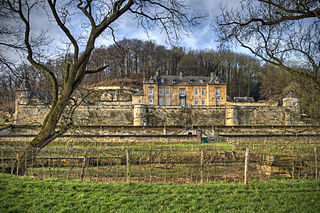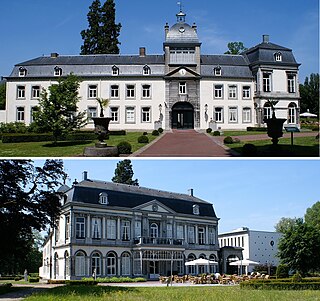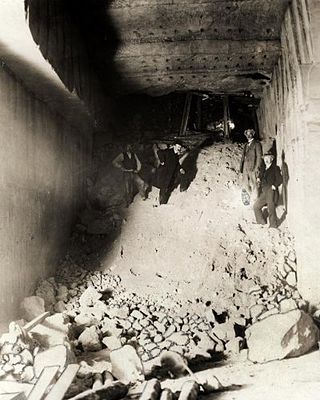36 Sights in Maastricht, Netherlands (with Map and Images)
Legend
Welcome to your journey through the most beautiful sights in Maastricht, Netherlands! Whether you want to discover the city's historical treasures or experience its modern highlights, you'll find everything your heart desires here. Be inspired by our selection and plan your unforgettable adventure in Maastricht. Dive into the diversity of this fascinating city and discover everything it has to offer.
Sightseeing Tours in MaastrichtActivities in MaastrichtThe Hell Gate, formerly known as Jekerpoort, Hoogbruggepoort, Alde Poort op den Ancker, Kruittorenpoort or De Twee Torens, is a former city gate in the Dutch city of Maastricht. The gate is part of the first city wall of Maastricht and is located in the Jekerkwartier at the southern end of the Sint Bernardusstraat, opposite the Pesthuys. The gate dates from the second quarter of the 13th century, making it the oldest surviving city gate in the Netherlands.
2. Kasteel Borgharen
Borgharen Castle is an originally medieval castle located on the river Maas in the village of Borgharen in the north of the municipality of Maastricht. The castle, the castle farm, the tenant farm and the gardens, including various gates, fences, quay walls and bridges, form a cluster of national monuments. The castle is part of the Geul & Maas estate.
3. Kasteel Vaeshartelt
Vaeshartelt Castle is an originally medieval castle and estate in the Meerssenhoven neighborhood in the northwest of the Dutch municipality of Maastricht. The country estate was owned by the royal family of the Netherlands for a short time and has been used as a hotel and conference center since 1994. The partly 18th, partly 19th-century castle with accompanying park and lands is a national monument and part of the Geul & Maas estate.
4. Sint-Martinuskerk

The St. Martin's Church or St. Martin's Church is a neo-Gothic church building in the Dutch city of Maastricht. The building by architect Pierre Cuypers is located in the historic Wyck district, between the Rechtstraat and the river Maas. The church is one of the four Roman Catholic parish churches in the center of Maastricht and is dedicated to Saint Martin of Tours. In the originally medieval church is the thirteenth-century statue of the Black Christ van Wyck, one of the popular devotions of Maastricht.
5. La Petite Suisse
Mariënwaard is a street and a hamlet in the Dutch municipality of Maastricht, located in the northern part of the district Maastricht-Oost. In the hamlet there are a few ordinary houses and two country estates: La Grande Suisse and Villa Kanjel. These two estates are depicted several times in the Album dedié a mes amis et mes enfants, which Petrus Regout, the former owner, had made in Paris around 1863. They are now part of the estate zone Buitengoed Geul & Maas, and are collectively referred to – sometimes only with regard to La Grande Suisse – as 'Mariënwaard Estate'. The name Mariënwaard is also linked to a defunct railway station and a viaduct from 2012.
6. Cannerberg

The Cannerberg is a hill near Maastricht, which is partly on Dutch and partly on Belgian territory. The hill is named after the town of Kanne, which is located just across the border in Belgium. The Cannerberg forms the western slope of the Jeker valley, opposite the Sint-Pietersberg. The ridge is an offshoot of the Haspengouw Plateau. Part of the hill was excavated between 1930 and 1939 for the construction of the Albert Canal, cutting off the ridge from the larger plateau.
7. Heilig Hart van Jezuskerk (Koepelkerk)
.jpg)
The Koepelkerk, officially Sacred Heart of Jesus Church, is a monumental domed church in the Dutch city of Maastricht. The church building is located a stone's throw from Maastricht Station on the corner of Scharnerweg and Heerderweg in Wyckerpoort in Maastricht-East. The church has been used from the beginning as a Roman Catholic parish church of the parish of the Sacred Heart of Jesus. Since 2021, the building has also housed an Eritrean Orthodox religious community.
8. Sint-Matthiaskerk

The St. Matthias Church, also known as St. Matthew, is a Gothic church building in the center of the Dutch city of Maastricht, located on the Boschstraat in the Boschstraatkwartier. The church is one of the four Roman Catholic parish churches in the center of Maastricht and is dedicated to the holy apostle Matthias.
9. Kasteel Meerssenhoven
Meerssenhoven Castle is a castle-like country estate and estate in the northeast of the Dutch municipality of Maastricht. The 18th-century building complex with accompanying park has been preserved in intact condition and has been a group of twelve national monuments since 2002. The estate in the Meerssenhoven neighbourhood east of Itteren is part of the Geul & Maas country estate.
10. Stadspark Maastricht

The Stadspark Maastricht is a city park on the edge of the center of the Dutch city of Maastricht. The park consists of a series of sub-parks, which were created in the course of the 19th and 20th centuries and each have its own atmosphere. The park design is largely determined by the presence of the fortifications of Maastricht.
11. Waalse kerk

The Walloon Church, also known as the French Church, is a church building in the austere Baroque style in the center of the Dutch city of Maastricht. The church is located on the Sint Pietersstraat in the Jekerkwartier, diagonally opposite the Old Friars Minor Church.
12. Kerk van de Allerheiligste Verlosser en H. Petrus
The Church of St. Peter Upstairs, officially Church of the Most Holy Redeemer and St. Peter, also known as St. Peter on the Hill, is a Roman Catholic church built in 1875 in neo-Gothic style, located in the Sint Pieter district of Maastricht. The church is used by the parish of St. Peter, just like the church of St. Peter downstairs. The church of St. Peter above is a national monument.
13. Jezuïetenberg
The Jezuïetenberg is a former marl quarry in the Cannerberg in the municipality of Maastricht. In the period 1880-1967, the Jesuits used the quarry for relaxation, creating many works of art in the form of drawings, sculptures and waterworks. This quarry has had the status of a national monument since 1998.
14. Sint-Petruskerk
The Church of St. Peter Below, officially St. Peter's Church, is a church building from 1938-39 in the Dutch city of Maastricht, located on the Sint Maternusstraat in the Villapark neighborhood. The building is used by the Roman Catholic parish of St. Peter, which has another parish church: the higher church of St. Peter above. The marlstone church was designed by the well-known architect Frits Peutz as an early Christian basilica and has been a national monument since 1993.
15. Augustijnenkerk
The Augustinian Church is a Baroque church building in the center of the Dutch city of Maastricht, located on the Kesselskade along the river Maas. The church was built in the 17th century as a monastery church for the Augustinian order. At the end of the 18th century, the monastery was dissolved and from that moment on the church fulfilled a multitude of functions. The Augustinian Church has been a national monument since 1966.
16. Poort Waerachtig
De Poort Waerachtig, also known as Poort Waarachtig, is a 19th-century gate in the center of the Dutch city of Maastricht. The gate was built as a pseudo-city gate in part of the medieval city wall to create a connection between the Begijnenstraat and the Sint Pieterskade in the Jekerkwartier.
17. Muizenberggroeve
The Muizenberg is an underground marl quarry located in the southern part of the Cannerberg, largely belonging to the municipality of Riemst (Belgium), on the border of the Netherlands and Belgium west of border post 70. The tunnel system used to have its own entrance on the Kanne-Vroenhoven road, also called Muizenberg, and south of the field road called chemin de la Xhavée. The partially collapsed quarry was connected to the Boschberg quarry, now also called the Castle Quarry or Cannerberg quarry.
18. Sint-Martinuskerk
St. Martin's Church is a church building in the village of Itteren in the northeast of the Dutch city of Maastricht. The church and its predecessors have traditionally served as the parish church of the Roman Catholic parish of Saint Martin (Saint Martin) in Itteren. The church has been a national monument since 1966.
19. Museumkelder Derlon
The Derlon Museum Cellar is a small archaeological museum in the centre of the Dutch city of Maastricht, where an important excavation from Roman times can be visited. The excavation has been protected as a national monument since 2004. The museum cellar is located in the basement of Hotel Derlon on the Onze Lieve Vrouweplein and is accessible on request.
20. Kloosterkerk Zusters Onder de Bogen
The Convent of the Sisters of Charity of St. Charles Borromeo, commonly referred to as the Convent of the Sisters Under the Arches, is a Roman Catholic convent located in the center of the Dutch city of Maastricht. The convent is the motherhouse of the Congregation of the Sisters of Charity of St. Charles Borromeo. The monastery is located in a number of historic buildings between the streets Sint Servaasklooster and Kommel. The monastery garden contains an important part of the remaining first city wall of Maastricht.
21. Johannes de Doperkerk
The St. John the Baptist Church, also known as St. John the Baptist Church, is a church building in the Maastricht district of Limmel. The church and its predecessors have traditionally served as the parish church of the Roman Catholic parish of John the Baptist in the former village of Limmel northeast of Maastricht. The neo-Gothic church by architect Carl Weber from 1864 is not a national monument, but was placed on the municipal monument list of Maastricht in 2002. An 11th-century baptismal font is the most important object in the church from an art historical point of view.
22. Sint-Corneliuskerk
The St. Cornelius Church, originally St. Martin's Church, is a Roman Catholic church building at Kerkstraat 10 in Borgharen, in the municipality of Maastricht. The church is a municipal monument. A number of objects in the church have the status of national monuments.
23. Sint-Theresiakerk
The St. Theresia Church is a church building in the Dutch city of Maastricht, located on the Theresiaplein in the neighborhood Biesland in Maastricht-Southwest. The Roman Catholic parish church is named after the 19th-century Saint Therese of Lisieux. Since 2022, the Saint Theresia parish has shared the church and outbuildings with the South Netherlands Philharmonic. The building of Kunrader stone from the early 1930s is a municipal monument.
24. Torenmolen van Gronsveld
The Torenmolen van Gronsveld is a tower mill near Gronsveld in the municipally of Maastricht, the Netherlands, which is still in working order. The mill was built in 1623 and is listed as a Rijksmonument, number 28086. It is the most southerly windmill in the Netherlands and the oldest of the province Limburg.
25. Charles Eyck Park
The Charles Eyck Park is a city park along the Meuse in the Céramique district in the center of the Dutch city of Maastricht. The fairly new park is named after the Limburg painter and sculptor Charles Eyck.
26. Sint-Walburgakerk
St. Walburga's Church is a church building in the Amby neighborhood in the east of the Dutch city of Maastricht. For centuries, the church has served as the church building of the Roman Catholic parish of Saint Walburga in the former village of Amby. The neo-Gothic church from 1867 is a municipal monument and holds a number of valuable art treasures.
27. Nieuwenhofpoortje
The Nieuwenhofpoortje, formerly known as the Begijnenpoortje or gate at the Zwingelput, is a poterne, a secondary gate in the city wall of the Dutch city of Maastricht. The gate was installed in the 14th century in the Nieuwenhofwal, part of the second medieval city enclosure of Maastricht and is located between the south end of the street Zwingelput (Jekerkwartier) and the pedestrian bridge over the southern Jeker branch in the Maastricht City Park.
28. Mariamonument
The Maria Monument, also known as Maria column or monument of the bishops of Maastricht, is a monument in honor of the Virgin Mary and four holy bishops of Maastricht in the center of the Dutch city of Maastricht. The sculpture group has been at the intersection of Stationsstraat and Wilhelminasingel since 1952 in the Wyck district. The artwork is a municipal monument.
29. Boschberg, hoofdingang (NATO-berg)
NATO Headquarters Cannerberg / Joint Operations Centre (JOC), located behind the Château Neercanne south of Maastricht, on the border with Belgium, was, during the Cold War, a communications center and headquarters of NATO. It housed the war headquarters of Northern Army Group and Second Allied Tactical Air Force.
30. Huis Eyll

The Huis Eyll, also known as Croonenhof, is a castle-like country house in the Heer district of Maastricht. The largely 18th-century building has been a national monument since 1966, as has the accompanying Hoeve de Croon. Special in the interior are the stucco decorations by Petrus Nicolaas Gagini.
31. Don Boscokerk
The Don Bosco Church is a modern church building in the Dutch city of Maastricht, located at Kardinaal van Rossumplein 97 in the Heugemerveld neighborhood. The former Roman Catholic parish church has been in use as a Baptist church since 2017.
32. Kasteel Bethlehem
Bethlehem Castle is a castle in Maastricht, in the south of the Netherlands. It was built in the 12th century. It is one of the oldest castles in the Netherlands. Nowadays it serves as a hotel and as part of the Maastricht Hotel Management School.
33. Sint-Janskerk
The Sint-Janskerk is a Gothic church in the center of Maastricht, Netherlands. The Protestant Sint-Jan is situated next to the Roman Catholic Basilica of Saint Servatius on the town's main square, Vrijthof.
34. Sint-Hubertuskerk
The Sint-Hubertuskerk is a former church building in the northwest of the Dutch city of Maastricht. From 1925 to 2009, the church served as the parish church of the Roman Catholic parish of St. Hubert in Boschpoort. The expressionist-style building designed by architect Jules Kayser has been a national monument since 1997.
35. Fallenberggroeve
The Fallenberg quarry is a former Limburg marl quarry in the Dutch South Limburg in the municipality of Maastricht. The quarry is located in the western valley wall of the Jeker valley and on the eastern slope of the Cannerberg. The quarry is located on the northern edge of the Cannerbos on the Zeenendaalweg.
36. Zuid-Willemsvaart
Lock 19 is a lock in the Zuid-Willemsvaart, located in the north of Maastricht. It is the last lock upstream before the Meuse and upstream of the mouth of the Voedingskanaal that supplies the Zuid-Willemsvaart with Meuse water.
Share
How likely are you to recommend us?
Disclaimer Please be aware of your surroundings and do not enter private property. We are not liable for any damages that occur during the tours.





















.jpg)





